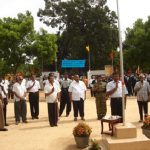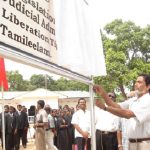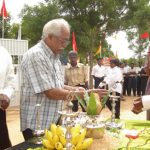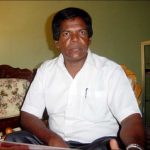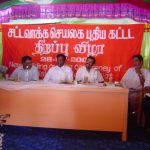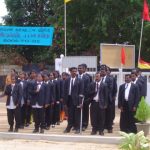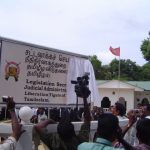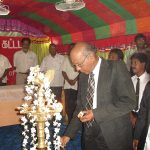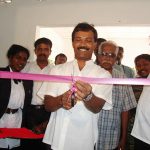

And the Laws of Civil and Criminal Proceedure and Evidence.
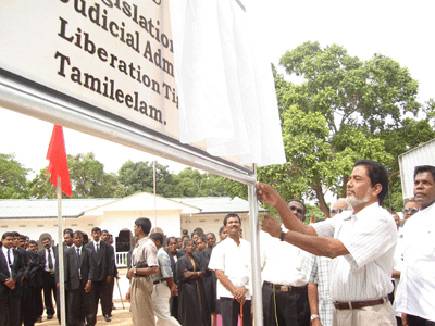
and the Laws of Civil and Criminal Proceedure and Evidence. Study Courses are devided into Internal and External Courses of Studies.
i) Internal Course of Studies has five terms extending to 3 years.
ii) External Course of Studies extends to 3 years.
All Students sit for the same examinations and on successful completion of studies are entitled to be enrolled as Attorneys-at-Law (Lawyers) as aforesaid.
Ceremonial opening of Legislation Secretariat of Judicial Administration of Tamileelam
Ceremonial opening of Legislation Secretariat of the Judicial Administration of Tamileelam was held on 26.07.2005 at 10 A.M. Traditional oil lamp was lightened by Mr.Pon Thiyagam who is in charge of Martyrs Home of Tamileelam. Tamileelam National flag was hoisted by the Head of Tamileelam Police. Unveiling of Legislation Secretariat Name Board was done by Mr.Balakumar, senior member of the LTTE.
Legislation Secretariat Building was ceremonially opened by cutting cord by the Head of Political wing of Tamileelam Mr.S.P.Tamilchelvan and the Law Library was opened by Dr.Nithiyananthan. Where so many attorneys at Law and Judges of Tamileelam from Mannar and Mullaitivu and attorneys at Law and Retired Judges from Vavuniya and Jaffna were present M.P for Mannar Mr.Selvam Adaikalanathan was also present at the occasion. Inquirers into sudden deaths and all J.PP were invited for occasion.
Following this, public meeting was held with Mr.Pararayasingam, the Head of Judicial Administration was the chair in a decorated Pandol. Some attorneys at Law from Vavuniya and Jaffna were called upon to lit the traditional oil lamp before the start of the meeting.
Mr.Nadesan was called upon to deliver a speech, who clearly expressed the progress made in the judicial administration of Tamileelam. Further said, that the Construction of building for legislation secretariat is a milestone indicating the progress made on a path of Tamils freedom fighting efforts. Even this building was funded by a well-wisher Dr.Nithiyananthan.
Later, the Head of Political wing Mr.S.P.Tamilchelvan was called upon to deliver a speech as a special invitee of the meeting. He expressed explicitly the current Political Situation of Tamileelam and the Governments motivated deceiving mentality through out.
At last a vote of thanks was delivered by Mr.Elankathir, the Deputy Head of Legislation Secretariat.
We, the Judicial Administration Division of Tamileelam invoke the assistance of well-wishers from all over the world whether financial or in kind to enable us to uplift the Judiciary to meet the needs of the people of Tamileelam.
Specially Law books on International Standards are urgently required to meet the needs of the Law students of our Law College.
Those who are willing, kindly contact the following address:-
Email: para@eelamjudicial.org
lawcollege@eelamjudicial.org
Telephone: +94-21-228-5055
Fax: +94-21-228-5055
Thanking you all
with kind regards,
Judicial Administration Division.
Thamil Eelam judiciary said a basis for rebuilding northeast [TamilNet, Thursday, 30 October 2003]
“The purpose of the LTTE’s legal system is to create a crime free environment where adjudication of civil and commercial disputes is fair and expeditious. This is the essential foundation on which one can rebuild Tamil society to achieve economic development and prosperity,” said Mr. E. Pararajasingham (Para), head of the Judicial Division of the Liberation Tigers, in an in depth interview with TamilNet this week about the LTTE’s legal system. “The very instruments designed to subvert the Rule of Law in the northeast were eventually turned on the Sinhala people too,” he points out.
Thamil Eelam Judiciary
“The manner in which the PTA was used to humiliate and oppress the Tamil people is a good example of the total failure and insensitiveness of the Sri Lankan judiciary in upholding the principle of the Rule of Law,” Mr. Pararajasingham said.
TamilNet interviewed the head of the LTTE’s Judicial Division at the Tamil Eelam Courts Complex in Kilinochchi.
TamilNet: Why did you create a separate judicial system? Was there any particular political reason or was it due to the exigency of circumstances?
Para: Let me first explain the political background. It is now generally accepted that the Sri Lankan constitution does not reflect the sovereign will or the aspirations of the Tamil people. It is the indubitable expression of Sinhala Buddhist supremacy in this island, drawn up by the Singhalese for the Singhalese. The Tamils were not in any manner, even for mere cosmetic purpose, associated in drafting or promulgating this constitution.
In fact the year before its promulgation the Tamil people living in the Tamil homeland gave a clear mandate at the general election of 1977 for establishing the separate sovereign state of Thamil Eelam as the only viable way for realising their rights and freedoms.
In any democracy sovereignty is vested in the people and is inalienable. The Tamils exercised their sovereignty to give a mandate for a separate state. It was never exercised in any manner to endorse the Sri Lankan constitution. In fact Tamils were deliberately excluded from its drafting and promulgation in 1978. This is why it remains an utterly inflexible unitary Sinhala Buddhist constitution. Eminent Tamil jurists and political scientists have elaborated on all this.
Therefore it is an illegitimate constitution designed to perpetuate Sinhala Buddhist hegemony and oppress the Tamils. It naturally follows that it would be preposterous for the Tamil people, particularly those living in the liberated parts of the Tamil homeland, to seek legal remedies from the judiciary established under the Sinhala hegemonic constitution. These, in brief, are the political and legal imperatives that underlay the creation of the Thamil Eelam judicial system.
Incidentally, the argument that the chapter on fundamental rights in the Sri Lankan constitution provides the framework for Tamils to realise their rights and aspirations is insidious and specious. This view is now being widely touted to the international community by some so called Sinhala liberals and unscrupulous Sinhala Marxists as a panacea to the Tamil people’s problems. I must also draw attention once more to the fact that the Sri Lankan constitution’s chapter on fundamental rights does not speak about the right to life.
It is comical how after the Sri Lankan state totally subverted the Rule of Law in the northeast – brutally wiping entire communities in several parts of the Tamil Homeland in the process- these so called Sinhala liberals and Marxists are trying to convince the world that the chapter on fundamental rights in the Sri Lankan constitution guarantees the Tamils all the rights and freedoms due to every citizen in a fully fledged democracy. This chapter in the final analysis is an utter travesty because the Sri Lankan constitution as a whole is designed precisely to prevent the Tamils from realising their rights and legitimate aspirations. This basic truth has been borne out well since 1972 when the first Sinhala Buddhist constitution was promulgated.
Thamil Eelam Judiciary
Mr. Pararajasingham
TamilNet: How do you envisage the role of the Tamil Eelam judicial system and laws in the present context of the LTTE’s efforts to rebuild the northeast? – Particularly in view of possible negotiations on a establishing an interim administration for the northeast.
Para: Rebuilding society in the northeast is often understood in terms of construction, laying of roads, repairing of water reservoirs, etc. But it is often overlooked that all this would be viable in the long term only if the moral fabric of our society, tattered by long years of war, destruction and displacement, is knit tightly together again. A crime free environment where adjudication of civil and commercial disputes is fair and expeditious is the essential foundation on which one can rebuild a society to achieve economic development and prosperity. This also is necessary to build a strong sense of confidence in the minds of the people who have seen all normal structures of their society fall apart under the relentless onslaught of Sri Lankan state terrorism on Thamil Eelam.
There is also another important reason behind our leader’s decision to establish a law and order system in Thamil Eelam.
States often control oppressed peoples by subverting the Rule of Law among them. By definition, denying a people their rights means the subversion or destruction of the Rule of Law, which is the expression of a people’s Sovereign Will. To conquer a people one has to break their collective will to remain sovereign. Therefore the public and covert strategies of imperial and oppressor states to crush peoples’ legitimate struggles for their rights and to plunder resources in third world countries have the ultimate effect of subverting the Rule of Law. Look at mineral rich countries in Africa like Congo; look at oil rich Middle East countries. This is why we wanted to lay a strong foundation for ensuring the Rule of Law in Thamil Eelam as an expression of the Tamil speaking people’s Sovereign Will.
The draconian Prevention of Terrorism Act (PTA) was introduced in 1979 with the specific aim of subverting the Rule of Law in the Northeast. Tamils as a whole were exposed to the racist whims of the Sri Lankan armed forces to which the PTA gave a legal blank cheque for indiscriminate arrest, torture and detention. The PTA, in conjunction with the Emergency Regulations (ER) precipitated a total break down of the Rule of Law in the northeast. Also, in enunciating fundamental rights, the Sri Lankan constitution does not speak of the right to life. The scant regard the Sri Lankan state and armed forces had for Tamil lives has been well recorded.
The manner in which the PTA was used to humiliate and oppress the Tamil people is a good example of the total failure and insensitiveness of the Sri Lankan judiciary in upholding the principle of the Rule of Law.
Therefore our people had neither political nor practical reasons for reposing any faith in the Sri Lankan judicial system. Incidentally, one should note here that these very instruments designed to subvert the Rule of Law in the northeast were eventually turned on the Sinhala people too. So much so that the Asian Human Rights Commission (AHRC) quite rightly stated recently: “the serious degeneration of Sri Lanka’s judiciary is now a matter of public record, both within the country and internationally.”
Therefore we as a liberation movement had to come up with an expeditious solution to prevent the collapse of the social order in the northeast while creating structures that would reflect the Sovereign Will of our people. So in the beginning we established mediation boards (Inakka Saphai) at the village level. These functioned from 1984 to 1992. But the mediation board system was a failure mainly because there was no legal code as basis for adjudication and because many of those who sat on the mediation boards weren’t educated and trained in law. It created a lot of problems for the Liberation Movement and led to frictions with society.
Thamil Eelam Judiciary
TamilNet: If that was the case, why did you let the mediation board system go on for so long – almost eight years?
Para: In the beginning we were a guerrilla organisation, engaging in hit and run tactics against the Sri Lankan armed forces. We had no stable control over large territories or populations. Therefore we neither had the resources nor the environment to set up and run a proper judicial system. But in 1993, as soon as we were in control of most of the north, our leader established the Tamil Eelam Judiciary and College of Law.
TamilNet: What is the structure of your judicial system now?
Para: There are six district courts – in Kilinochchi (Jaffna and Kilinochchi Districts), Mallavi (for the Vavuniya District), Jeyapuram (Mannar District), Puthukkudiyiruppu (Mullaithivu District), Trincomalee and Batticaloa.
Each court has a Family Counselling Unit.
There are two high courts – one in Kilinochchi and the other is Mullaithivu.
The Thamil Eelam courts have heard 24000 cases and delivered judgements on 20000 so far – that is since they were first established ten years ago.
There is an appeal court in Kilinochchi and we have created a ‘Special Bench’ to hear cases rejected by the Appeal Court.
We have also established a Review Committee on Appeal for Pardon to which those who have been sentenced to death can have recourse.
TamilNet: Is this Special Bench the equivalent of a supreme court?
Para: We wouldn’t yet call it that. But it functions as a kind of apex body of the Thamil Eelam judicial system.
TamilNet: Critics in the south say that your judiciary is not really independent – that it is a travesty of justice. What do you say?
Para: This is part of the subtle smear campaign to discredit our system – to delegitmise it. It is for the Tamil people to decide how fair and expeditious our judiciary is. And there are already very clear signs that given a choice people prefer to bring their disputes to our courts. We are in the process of evolving – learning from experience and knowledge of other judicial systems in the world.
I must also add here that the contours of the space within which our legal system has to function is quite limited by political, economic and military pressures. But as this space expands in the future we would be in a position to adopt measures that would perfect our legal system to match international standards.
Thamil Eelam Judiciary
District Court in Kilinochchi
TamilNet: How about members of the LTTE? Do your laws apply to them?
Para: Certainly. If a member of the LTTE commits any act in violation of the laws of the land he or she will be dealt with accordingly under our legal system like anyone else in Thamil Eelam. Our leader has been very clear on this.
TamilNet: What would you consider the milestones in the ten years of your judiciary?
Para: The Tamil Eelam Penal Code and the Thamil Eelam civil code, which were enacted in 1994. The Thamil Eelam Law College was another milestone. It was established in 1991. We made special laws for women regarding their property rights, rape, abortion etc. Under our laws women are totally free and on par with men in property transactions. As you know, this is not the case under Jaffna’s traditional law, Thesawalamai. Our civil code has done away with the stipulation in Thesawalamai that a woman should obtain her husband’s consent to sell her property. We made caste discrimination a crime. These could be considered some of the milestones of the Thamil Eelam judicial system.
TamilNet: On what basis was the Thamil Eelam Penal Code enacted?
Para: Distinguished Tamil jurists, legal experts and leading lawyers studied the British, Indian and Sri Lankan criminal justice systems before formulating the Tamil Eelam Penal Code. We have identified 439 types of crimes. Some crimes considered liable for punishment in the Sri Lankan Penal Cod are treated less harshly in our Code. We are in the process of reviewing provisions in the penal code that permit capital punishment in the light of the increasing international trend against it. However, until such time anyone sentenced to death can petition the Review Committee seeking pardon.
We are endeavouring to introduce progressive laws relating to women. We brought an amendment to the penal code in connection with abortion. Earlier it was permissible on medical or other reasonable grounds only with the consent of both husband and wife. Under the said amendment a woman can take the decision on her own to abort her pregnancy within five months of conceiving on medical or other reasonable grounds.
Thamil Eelam Judiciary
Court of Appeals
TamilNet: How was your civil procedure code drafted? There are two specific set of local laws, Thesawalamai in Jaffna and the Mukkuwa Law in Batticaloa. Then there are numerous customs governing various communities of Tamils in the northeast, recognised as valid in adjudication by British and Sri Lankan legal systems. How does your civil code deal with all this?
Para: The Tamil people had their own legal systems before the colonial conquests. Obviously Tamils could not have sustained vast stable empires and their large sea faring merchant guilds for several centuries without such systems. These fell apart in the chaos wrought by colonial rule in its early phases.
However, as our traditional legal systems had crumbled with the waning of Tamil kindgoms, the Dutch made an effort in the 18th century at compiling some of our traditional customs into a legal code for the purposing establishing their rule on a firmer footing.
In 1704 the Dutch governor of Ceylon, Cornelis Joan Simmons, instructed Claas Isaakz, a Dutch official in Jaffna, to inquire into the customs of the Tamil inhabitants of Jaffna as then existed and to compile them. Isaakz completed the work in Dutch three years later in 1707 and handed it over to the Jaffna commander Van Der Duyn who directed that it be translated into Tamil. Commander Duyn subsequently gave copies of this translation to twelve “sensible” – in his words – Mudaliyars (Tamil chief officials nominated by colonial rulers) and asked them to study the compilation and revise it where necessary.
The Mudaliyars agreed with the translation and Isaakz’s compilation was promulgated by the Dutch governor in 1708 as the law applicable to the Tamil inhabitants of Jaffna. This is what came to be known as Thesawlamai.
Similarly, the Dutch compiled the Mukkuwa Law regulating the succession to intestate property of the Mukkuwa community in Batticaloa.
Besides these two, there were other traditional customs relating to property, succession, marriage, temple transactions, etc., among Tamils in the northeast which have on occasion been treated as customary law by western colonial governments.
None of these have been compiled and codified although the expertise and knowledge of local pundits and scholars have been sought by courts from time to time to throw light on specific civil disputes.
How do we make laws on the basis of these in tune with the far-reaching changes in our society since colonial times, particularly since the upheavals of the war began transforming our society in ways we never imagined possible? This is the serious question before us now.
Mukkuwa Law in Batticaloa, for example, is not applicable to everyone in that region. It applies to a particular community which no longer has well defined social contours.
A good portion of Thesawalamai as it stands is obsolete and ineffective. What Thesawalamai says about the slavery, adoption and caste are no longer valid; slavery and caste discrimination which Theswalamai talks about are abominable to the modern Tamil sensibility.
Therefore we are in the process of studying and compiling all local customs governing communities in the northeast and are planning to discuss them with a panel of experts from all parts of the northeast.
What comes out these deliberations would contribute to enhancing our civil procedure code in the near future. It is our leader’s concern that the Thamil Eelam civil procedure code should be progressive and meticulously equitable while reflecting the traditional norms of all sections of our society – that it should provide the basis for building a forward looking, modern society rooted in its soil.
முழுமையான . கீலே அழுத்தவும்….PFD FILE
![]()
Thamil Eelam judiciary said a basis for rebuilding NE TamilNet_ 30.10.03
Rule of Law, values said basis of Tamil society TamilNet_ 25.01.04
LTTE opens first Thamileelam court in Trincomalee district 02.12.02
TE Law College releases book on ‘Family Law’
